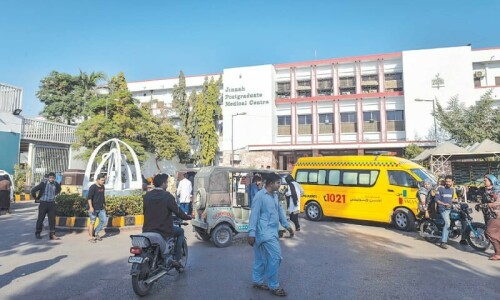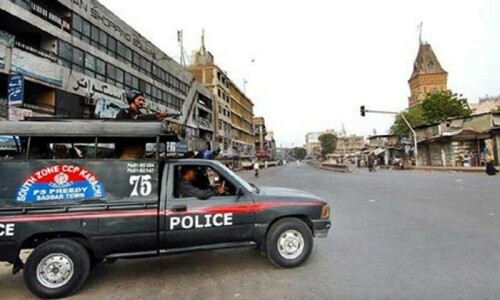KARACHI: “Architects, please design suitable, adaptable housing that will suit poor people,” said honorary professor of housing at the city and regional planning department, Cardiff University, Prof Yap Kioe Sheng, during his keynote address on ‘The right to adequate housing for all’.
He was speaking at the 9th seminar on urban and regional planning, ‘Housing for all’, organised by the department of architecture and planning of the NED University of Engineering and Technology on the campus on Saturday.
“Often politicians announce the construction of hundreds or thousands of houses for the poor, but building houses is the output, not the outcome, for it is only after you build the houses that you will know if you have helped improve the lives of the people or created a bigger problem for them. What we call development may be like punishment for many,” he said raising many questions in the minds of the architects and builders present at the seminar.
“Any attempt to supply housing through a centralised, standardised approach is complicated by the wide variety in housing needs across the urban population. The rich design and build their own house to ensure that it meets their specific needs. Middle-income families accept pre-designed houses but the market ensures the required variety and the middle-income family makes trade-offs to meet their housing needs as much as possible. The poor design, build and improve their informal housing according to their needs and resources, ignoring regulations that would make the house unaffordable. In public-sector housing projects, the poor must accept what has been designed and built for them,” he said.
“The construction of medium-rise buildings with small low-rent apartments has proven time and again to be ineffective and too expensive to address the low-income housing problem. Such housing has to be subsidised to be made affordable for the urban poor, but this makes it unaffordable for the government given the magnitude of the needs for low-income housing. Because many urban poor for whom the housing is intended consider it unsuitable to their needs, they are quite willing to sell the unit or the right to its occupancy. Highly subsidised housing becomes an easy prey for middle-income families, who are equally desperate to find adequate housing. Without suitable housing the urban poor families return to their informal housing.”
Prof Sarosh Hashmat Lodhi, dean, faculty of civil engineering and architecture, NED, said: “Whenever there is a posh locality, you have to have a colony nearby to house people who provide services to the people residing in the posh areas. After all, the people who work for you also need to live somewhere nearby.”
A professor of urban planning & international development, Cardiff University, Prof Alison Brown, in her paper, ‘Urban myths and the invisible workforce: globalisation, hidden labour and the home as a workplace’, challenged urban myths such as the invisible workforce in home-based enterprises are accidental in housing policy and the slum economies contribute little to urban economic development. “The productive value of the home as a source of income and site of work is undervalued. And the world economy is changing. Globalisation has resulted in a dramatic structural transition to new patterns of employment with a rapid increase in informal, unregulated and casual work particularly in urban areas. From self-employment, or piecework to rental, income streams are linked to the home, while slum neighbourhoods, support cluster economies and mobile phones open new horizons for work,” she said.
In their paper, ‘Transformation of Karachi into a green walkable city’, visiting professors at KU Leuven, Belgium, joining in through Skype said that in Karachi and other cities of Pakistan, urban communities housing millions grew alongside the sewage drains adding to the urban sprawl, long transport routes, ghettoisation, inner city heritage disintegration and socio-cultural divide.
It was said that the nullahs (stormwater drains), the natural lungs of any area, over time became open semi-covered or covered sewage-laden backwaters in the cities where all sorts of residential, commercial and industrial encroachments sprung up while the richer parts of the city turned their backs to it and dump their own waste into it as well. So there is a need for utilising the potential role of the nullahs in Karachi as a citywide non-vehicular mobility network, which will lead to a cleaning up of the drains, connect its bordering formal and informal housing corridors to public open spaces, reconnecting and recreating the lost ecological, recreational, social and cultural balance in the city.
NED university vice chancellor Dr Mohammad Afzal Haque, chairman of the department of architecture and planning Prof Dr Noman Ahmed, chairman of the department of urban and infrastructure development Prof Dr Mir Shabbar Ali, director collective for social science research, Karachi, Dr Haris Gazdar, former Sindh chief secretary and chairman of SAIBAN Action Research for Shelter Tasneem Ahmed Siddiqui also spoke.
On the occasion, DHA administrator Brig Mohammad Abdullah who was the chief guest announced a Rs500,000 donation for the NED university.













































Dear visitor, the comments section is undergoing an overhaul and will return soon.